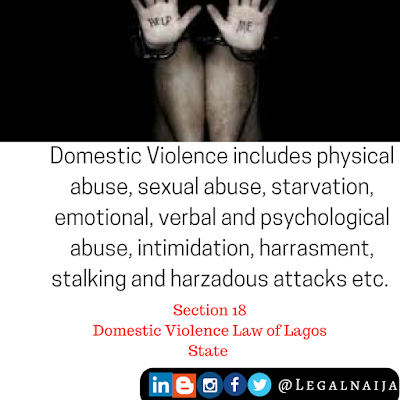
Acts considered domestic violence in Lagos | Adesuwa Omozusi

Acts characterized as Domestic Violence
under the Domestic Violence Law of Lagos, 2007.
under the Domestic Violence Law of Lagos, 2007.
The
occurrence of domestic violence in Lagos is on the increase, initially it was somewhat
considered a subtle issue, but with the rate of publications made daily; it
will interest you to know the actions that constitute Domestic Violence in
Lagos State.
occurrence of domestic violence in Lagos is on the increase, initially it was somewhat
considered a subtle issue, but with the rate of publications made daily; it
will interest you to know the actions that constitute Domestic Violence in
Lagos State.
The
Domestic Violence law of Lagos was enacted in 2007. Section 18(1) (g) provides
a list of actions that can be characterised as Domestic Violence in the state.
They are as follows:
Domestic Violence law of Lagos was enacted in 2007. Section 18(1) (g) provides
a list of actions that can be characterised as Domestic Violence in the state.
They are as follows:
Ø Physical
abuse; any act or threatened act of physical violence towards the person.
abuse; any act or threatened act of physical violence towards the person.
Ø Sexual
abuse exploitation including but not limited to rape, incest and sexual
assault; any conduct that abuses, humiliates, degrades or otherwise violates
the sexual integrity, or dignity of the victim.
abuse exploitation including but not limited to rape, incest and sexual
assault; any conduct that abuses, humiliates, degrades or otherwise violates
the sexual integrity, or dignity of the victim.
Ø Starvation;
Ø Emotional,
verbal and psychological abuse; means
a pattern of
degrading
or humiliating conduct towards a complainant, including––
verbal and psychological abuse; means
a pattern of
degrading
or humiliating conduct towards a complainant, including––
i. repeated insults, ridicule
or name calling as to cause emotional pain;
or name calling as to cause emotional pain;
ii.
repeated threats to cause
emotional pain; or
repeated threats to cause
emotional pain; or
iii. repeated exhibition of
obsessive possessiveness or
jealousy
which constitute a
serious invasion of the complainant’s
privacy, liberty, integrity or security;
obsessive possessiveness or
jealousy
which constitute a
serious invasion of the complainant’s
privacy, liberty, integrity or security;
Ø Economic
abuse and exploitation; refers to:
abuse and exploitation; refers to:
i.
the unreasonable
deprivation of economic or financial resources to which a complainant is entitled under the Law
or which the complainant requires
out of necessity,
including household necessities for the complainant, and mortgage
bond repayments or payment of rent in
respect of the shared residence; or
the unreasonable
deprivation of economic or financial resources to which a complainant is entitled under the Law
or which the complainant requires
out of necessity,
including household necessities for the complainant, and mortgage
bond repayments or payment of rent in
respect of the shared residence; or
ii.
the unreasonably disposal or
seizure of household
effects or other
property in which
the complainant has
an interest including any equitable; or legal interest;
the unreasonably disposal or
seizure of household
effects or other
property in which
the complainant has
an interest including any equitable; or legal interest;
Ø Denial
of basic education;
of basic education;
Ø Intimidation;
means uttering or
conveying a threat,
or causing a complainant to receive a threat, which
induces fear, anxiety;
means uttering or
conveying a threat,
or causing a complainant to receive a threat, which
induces fear, anxiety;
Ø Harassment;
means engaging in a pattern of conduct that induces the fear of harm to a complainant including;
means engaging in a pattern of conduct that induces the fear of harm to a complainant including;
i. repeatedly watching, or
loitering outside of or near the building or place where the complainant
resides, works, carries
on business, studies and place
of recreation after studies.
loitering outside of or near the building or place where the complainant
resides, works, carries
on business, studies and place
of recreation after studies.
ii. repeatedly making
telephone calls or inducing another person to
make telephone calls
to the complainant,
whether or not
conversation ensues;
telephone calls or inducing another person to
make telephone calls
to the complainant,
whether or not
conversation ensues;
iii. repeatedly sending,
delivering or causing the delivery of letters,
telegrams, packages, facsimiles,
electronic mail or
other
objects to the complainant;
delivering or causing the delivery of letters,
telegrams, packages, facsimiles,
electronic mail or
other
objects to the complainant;
Ø Stalking;
means repeatedly following,
pursuing, or accosting
the victim;
means repeatedly following,
pursuing, or accosting
the victim;
Ø Hazardous
attack including acid both with offensive or
Poisonous substance;
attack including acid both with offensive or
Poisonous substance;
Ø Damage
to property; means the wilful damaging
or destruction of property
belonging to a complainant or in which the complainant has a vested
interest, whether legal or equitable;
to property; means the wilful damaging
or destruction of property
belonging to a complainant or in which the complainant has a vested
interest, whether legal or equitable;
Ø Entry
into the complainant’s residence without
consent where the parties do not share the same residence;
or
into the complainant’s residence without
consent where the parties do not share the same residence;
or
Ø Any
other controlling or
abusive behaviour towards
a
complainant, where such conduct harms or may cause imminent
harm to the safety, health or well-being of the complainant;
other controlling or
abusive behaviour towards
a
complainant, where such conduct harms or may cause imminent
harm to the safety, health or well-being of the complainant;
Ø Deprivation.
The
law is not gender specific as it relates to man, woman and child. There must be
a domestic relationship between the parties for it to suffice.
law is not gender specific as it relates to man, woman and child. There must be
a domestic relationship between the parties for it to suffice.
A
Domestic relationship such as marriage, cohabitation, dating or customary
relationship, family member or domestic staff is sufficient.
Domestic relationship such as marriage, cohabitation, dating or customary
relationship, family member or domestic staff is sufficient.

Adesuwa Omozusi is an Associate at Cowrie Partners


